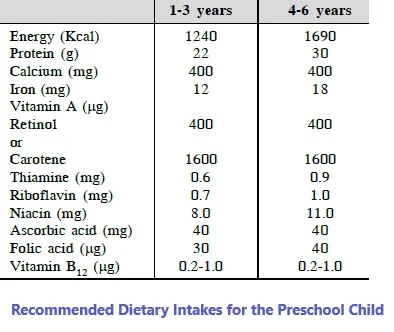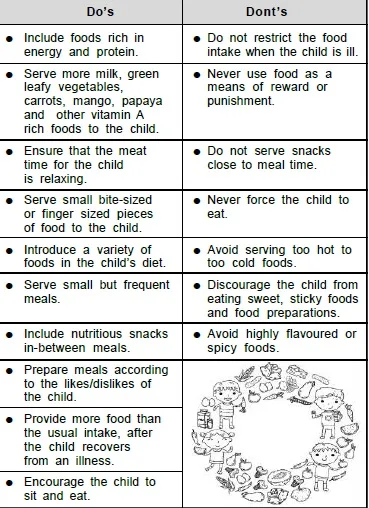Meal Planning for preschool Child|Nutrition for Preshoolers|ICDS Supervisor Kerala Study Materials
THE PRESCHOOL CHILD
A child in the age group 1-6 years is a preschool child.
From the growth and development standpoint the preschool child, like the infant is extremely vulnerable.
A preschooler grows rapidly, but when compared to infancy, the rate of growth is somewhat slower and more gradual.
The average gain in weight during the preschool age is only about 2-2.5 kg each year.
the preschool child gains comparatively more in height than in weight.
By three years the child is about 93 cm tall and by four years about 100 cm tall.
Because of this the child gives an appearance of being tall and thin as com pared to the round and chubby appearance characteristic of infancy.
Another characteristic feature of the preschool child is the increased physical activity.
The infant from being dependent on the mother moves on to becoming independent especially in terms of gaining control over the body.
The increased physical activity and the growth taking place during the preschool stage
necessitates a higher intake of nutrients.
Regular weight gain is the most important sign of the child’s overall health and nutritional status.
Weighing the child once every three months during the second year and subsequently once a year, till the child goes to school, would give a good indication of the child’s growth.
Any subnormal growth or growth failure can be easily detected and corrected.
It is during the early years of childhood i.e., 0-6 years, that “catch-up” growth is possible.
What do you mean by “catch- up” growth?
To understand this, consider a case of growth failure i.e., a child, whose heightweight is considerably lower as compared to other children of his age.
Now, if during infancy and preschool years right inputs i.e., good diet and clean, safe hygienic living conditions are provided, it will be possible for the child to make up for the earlier deficit in growth and development.
From this standpoint, therefore, preschool period is very crucial. Diet plays an important role in promoting good health.
RECOMMENDED DIETARY INTAKES FOR THE PRESCHOOL CHILD
The recommended dietary intake that would support optimum growth and development of the preschool child is given in Table below:
The preschool years represent the age from approximately 1 year to 6 years.
It is obvious that at any given age the nutrient need would vary depending on the level of growth and physical activity.
This is the reason why the nutrient need of the preschool child is given under two categories—1-3 years and 4-6 years in above Table.
The total energy requirement of the preschooler increases with age.
The requirement for other nutrients (in proportion to body size) is also high but the need for a few nutrients like protein, calcium, vitamin A and iron is the most.
This is so because these nutrients support the growth and development of the body.
A preschool child is more prone to infections and diseases hence protective nutrients,
especially vitamin A and iron are particularly important.
The diet of the preschool child must provide sufficient amount of these nutrients.
MEAL PLANNING FOR THE PRESCHOOL CHILD
The preschool years are the time to establish good eating habits in children.
At the same time the influence of parents, friends, television, activities associated with food, help to shape the child’s food habits.
Providing an adequate diet for the child is, therefore, a challenging task.
Which are the Nutrients of Particular Importance?
Some of the nutrients which are crucial for the growth and development of a preschool child include:
Energy-giving nutrients (carbohydrates and fats)
Protein
Calcium
Iron and
Vitamin A
Which Food to Select for preschool child?
The diet of the preschool child must include at least one food item from each of the three major food groups namely energy-giving, body-building and protective/regulatory.
But the need for energy, protein, calcium, iron and vitamin A is considerable during the preschool age.
Hence, include more of energy-rich foods, specially cereals; protein-rich foods such as pulses, meat, egg; calcium-rich foods particularly milk and milk products and iron-rich foods such as meat (particularly liver) pulses and green leafy vegetables in the diet.
What should be the Meal Pattern for preschool child?
The preschool child may not be able to eat much at one meal.
Hence, small frequent meals need to be given.
A preschool child would benefit from three small meals plus 2 to 3 snacks in-between meals per day.
The meal pattern adopted would actually depend on the age of the preschool child. Consider the list of meals given under A and B.
(A) Is likely to be adopted for a 1½ year old child.
The child needs to be given food every 3-4 hours.
Atleast 2-3 milk feeds (early morning, tea, bed time) should be given. In addition foods of high
protein and energy content should be given 4-5 times a day.
(B) Is likely to be adopted for a 3-5 year old child.
In addition to 2 milk feeds, and three main meals (breakfast, lunch, dinner) other nutritious foods, snacks and food preparations should be served inbetween meals.
What are the Food Preparation/Snacks Suitable for the Preschool Child?
Any snack/food preparations based on the common locally available cereals and pulses can be prepared.
The snack should provide on an average 300-400 kcals.
But, ensure that the bulk of the preparation fed to the child is not very large.
A child will remain healthy and well nourished provided food/snacks of high energy / protein / calcium /vitamin A content are given (without increasing the bulk/ volume). Snacks should supplement not substitute the main meals.
Snacks should be such that are easy to prepare and should be in a form easily handled by the child.
What are the other Specific Considerations?
Mealtime for children should be relaxing and enjoyable.
Children learn to enjoy food when they are allowed to feed themselves. It is easier for the
child to feed on his own if food is cut into bitesized pieces that can be readily handed and lifted to the youth. Children like foods that can be eaten with the fingers.
When introducing new foods to the child, offer one at a time. Give only small amounts at first.
Let the child make the decision of liking or disliking the food. Never make an issue of food acceptance.
Forcing the child to eat a particular food may, establish an unfavourable attitude towards that food.
If the food is rejected, wait for a few weeks and then try again.
Children of preschool age develop very strong likes and dislikes for certain foods.
They might avoid eating one or more essential foods.
For example, green leafy vegetables, milk are usually disliked by children. In such situations, therefore, it is advisable to change the form of the food and then serve it to the child rather than totally omit it from the diet.
Fewer difficulties are likely to be encountered if foods which are disliked by children are given when the child is hungry.
Children are easily influenced by the parents attitudes towards food.
Parents should, therefore, be extra careful of not to express their likes and dislikes in front of children.
Rather they should eat a variety of food and encourage the child to do the same.
Foods served to children should be warm and not too hot or too cold.
Children usually have a very high taste sensitivity.
They do not enjoy highly flavoured foods.
Only mildly flavoured foods should be included in the diet.
The digestive tract of the preschool child is easily irritated by spicy food, very sweet or fried foods.
Hence, such foods should be avoided.
Further consuming excessive amounts of fibrous food also irritates the tender digestive tract.
It is, therefore, advisable to use a minimum of fibre-rich foods for preschool children.
Preschool children are almost constantly active.
Their interest is readily diverted from food. Hence, it is essential to prepare meals that look colourful, attractive and catch the attention of the child and motivates them to eat.
It is important that the child eats a good breakfast.
Breakfast should supply upto one-third of the day’s energy requirement. A good nutritious breakfast served in the morning would help increase physical and mental efficiency of the child.
Simple tips on how to provide adequate and satisfying meals for preschoolers are listed below in points to remember.
Read Also:
ICDS Supervisor Questions and Answers
Common Health Problems in India & Different Levels of Health care in India
1. Meal Planning for the Infant
2. Spplementary foods for Infants
4. How to Feed Infant? Meal Plan for Infants
5. Meal Planning for the Prechoolers
Topic wise Notes for ICDS Supervisor Exam
3. Psychology
4. Physiology
5. Microbiology
6. Sociology
MCQ Questions & Answers for ICDS Supervisor
2. Previous Questions MCQ|ICDS Supervisor Exam|ICDS Supervisor Kerala PSC (1-20)
3. Previous Questions MCQ|ICDS Supervisor Exam|ICDS Supervisor Kerala PSC (21-30)
13. ICDS Supervisor Previous Questions Set 1
14. ICDS Supervisor Previous Questions Set 2
15. ICDS Supervisor Previous Questions Set 3
16. ICDS Supervisor Previous Questions Set 4
17. ICDS Supervisor Previous Questions Set 5
18. ICDS Supervisor Previous Questions Set 6
19. ICDS Supervisor Previous Questions Set 7
20. ICDS Supervisor Previous Questions Set 8
21. ICDS Supervisor Previous Questions Set 1
22. Elementary Care & Education MCQ
23. Solved Previous Question Paper ICDS Supervisor
24. Women & Child ICDS Supervisor Exam
25. Extension Education Notes for ICDS Supervisor
26. Complete NOTES Child Psychology
Nutrition Notes
More Topic wise Notes can be got from the Website https://www.previousquestions.in
To Join Telegram, Click Here
Check These also
Job News
Exam Preparation
Exam Preparation
Download printable OMR Sheet PDF for practice
ബിഹേവിയറിസം
ഗസ്റ്റാള്ട്ടിസം Gestaltism Learning methods
ജ്ഞാതൃവ്യവഹാരവാദം ( Cognitive behaviorism)
ജ്ഞാതൃവാദം (Cognitivism)
നാഡീമന:ശാസ്ത്രം (neuropsychology)|പഠനത്തെ സ്വാധീനിക്കുന്ന ഘടകങ്ങള്
വ്യക്തിത്വം Personality
PART 2 ഉള്പ്പെടുത്തിയുളള വിദ്യാഭ്യാസം Inclusive education
ദിനാചരണങ്ങള് Important dates based on themes











![[Set 3] MCQ for ICDS Supervisor Exam|ICDS Supervisor Kerala PSC](https://blogger.googleusercontent.com/img/b/R29vZ2xl/AVvXsEirmpde6UGlx94eDLtWkrJ18PAc_d8GVw_K-4E1izTltkjugPJEyBVplbm_S85f0gxNowfcbT6afCPnAjTF0_TKYK9Lq7zm1fnQU-TPsKEosx0opg5d05b-nry5qBPrKUZMoVD7BOFpW-5jxoAlMCTysmHKi30ieam3tPtA_ohH_Z5D2Uu1PPxt-qZ38wY/s72-c/icds-supervisor-mcq.jpg)

![[Solved paper]Assistant Engineer Agriculture Kerala PSC Previous Question Paper|Assistant Engineer Agriculture Kerala PSC Question paper 665/2022](https://blogger.googleusercontent.com/img/b/R29vZ2xl/AVvXsEiE5XMCyjBp5qgQ6gc1f5YxnObTDPt4ioa1TM0DhzIzBsKfJUJZg1nhfOcliABQCpnIj9INlw2xliBzlEEPCd_tgUhxvJhySogAkZFGKaWZ9GujHt4KwM-DSmOLBbLLlexxurubFQobMSgo11YP_2eVKCTrV0CWiwOlouEr1abUj5m6V5fJomuMxLK5U5o/s72-w640-c-h360/Assistant%20Engineer%20Agriculture%20Kerala%20PSC%20Previous%20Question%20Paper.jpg)
